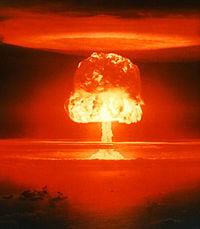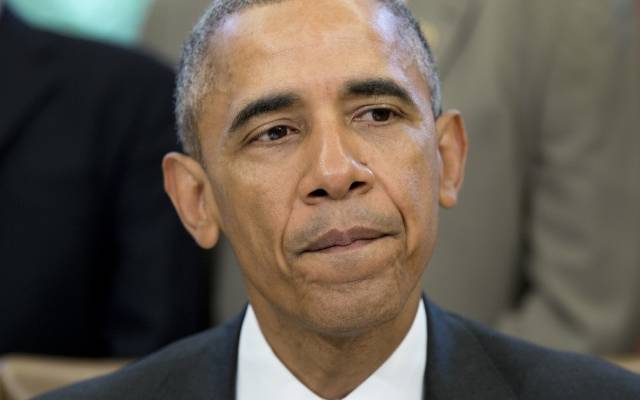Are Khamenei’s threats real or not? Is US cooperation with Iran an option? Obama’s statements on the nuclear deal and the risks involved seem significantly contradictory.
US President Barack Obama, as part of his aggressive campaign to win public support for his Iran deal – support which seems to be quickly slipping – sat down with group of reporters for a briefing last Wednesday, hours before he delivered a combative speech defending the Iran deal at the American University.
During the interview, he was asked by a New Yorker reporter, who described the president as “congenial and stoic” but who was conspicuously frustrated, about the threat by Iran’s leaders to wipe Israel off the map and to carry on their war against America, which it describes as the “Great Satan.”
Obama said that he took Iranian Supreme Leader Ayatollah Ali Khamenei at his word, especially on Israel. “His ideology is steeped with anti-Semitism, and if he could, without catastrophic costs, inflict great harm on Israel, I’m confident that he would,” the president said.
Even so, he went on, “it is possible for leaders or regimes to be cruel, bigoted, twisted in their world views and still make rational calculations with respect to their limits and their self-preservation.” He said Iran could be seen as making “constant, calculated decisions.”
The reporter then asked Obama how the ongoing chants of “Death to America” by Iranian crowds influenced his thinking during the 20 months of difficult negotiations. “It’s not appealing to deal with countries that express hatred towards us. It wasn’t easy to negotiate arms agreements with a near military peer [Soviet Union] that could blow up every American city,” he said. “But when it comes to arms-control agreements, or non-proliferation agreements of any magnitude, by definition you’re generally dealing with those folks. I don’t have to negotiate an arms agreement with Great Britain or with France.”
Critics note that there are vast differences between the situation vis-vis the USSR and Iran. Iran in 2015 is nothing like the Soviet Union in 1963, they say.
Serious Threats vs. Schoolyard Taunts?
Obama’s statements seem somewhat contradictory. While he claims to take Iran’s threats against the US seriously, he compares them to schoolyard taunts from a “little guy.”
“Part of the underlying premise of why people don’t feel we should have to put up with that stuff is we’re bigger; if we launch a military strike, we can wipe them out,” he said. “There is a little bit of that schoolyard attitude of, it’s one thing for a guy your own size to mouth off to you. But if there’s a little guy, you should just smack him around. And it’s probably bad advice in the schoolyard. It’s certainly not a good way to run a foreign policy.”
Obama was unapologetic about dealing with the Islamic Republic, which is held responsible—directly or indirectly—for the deaths of thousands of Americans, the New Yorker noted. Three Iranian-Americans are still detained in Iran, and a former FBI agent disappeared on an Iranian island in 2007. The Administration is not counting on the possibility that a deal over Iran’s nuclear program will alter Iran’s politics—or produce détente.
“There is nothing in this deal that is dependent on a transformation of the character of the Iranian regime,” Obama said. “This does not represent a strategic rapprochement between the United States and Iran. This is a hardheaded, clear-eyed, calculated decision to take—to seize our best opportunity to lock down the possibility of Iran getting a nuclear weapon.”
However, speaking to CNN last Sunday, he said the opposite, claiming he saw a chance for improved relations between the US and Iran in wake of the deal.
Obama said a constructive relationship with Iran could be a by-product of the deal to limit its nuclear program, but it would not happen immediately, if at all.
He told CNN that Iran’s “nuclear problem” must be dealt with first and that resolving the Iranian nuclear issue could open the door to broader talks on other issues.
“Is there the possibility that having begun conversations around this narrow issue that you start getting some broader discussions about Syria, for example, and the ability of all the parties involved to try to arrive at a political transition that keeps the country intact and does not further fuel the growth of ISIL and other terrorist organizations. I think that’s possible,” Obama said, referring to the Islamic State group by one of its acronyms. “But I don’t think it happens immediately.”
In the interview, Obama did not answer directly when asked whether he would use military force to prevent Iran from getting a nuclear weapon if the deal falls through.
“I have a general policy on big issues like this not to anticipate failure,” Obama said. “And I’m not going to anticipate failure now because I think we have the better argument.”
By: United with Israel Staff
AP contributed to this report.

Sign the Petition to Stop a Nuclear Iran
The US Congress must ensure that sanctions against Iran remain in force until the nuclear threat is completely eliminated.
I strongly oppose easing sanctions before the nuclear threat from Iran has been eliminated. Allowing Iran to enrich uranium without being subject to 'anytime, anywhere' inspections is extremely dangerous and unacceptable. Iran's nuclear program must be stopped.
See our Privacy PolicyClick Here to Share the Petition with Your Friends
Click here to locate and contact your Senator.
Click here to locate and contact your Congressman.
Do You Love Israel? Make a Donation - Show Your Support!
Donate to vital charities that help protect Israeli citizens and inspire millions around the world to support Israel too!
Now more than ever, Israel needs your help to fight and win the war -- including on the battlefield of public opinion.
Antisemitism, anti-Israel bias and boycotts are out of control. Israel's enemies are inciting terror and violence against innocent Israelis and Jews around the world. Help us fight back!



